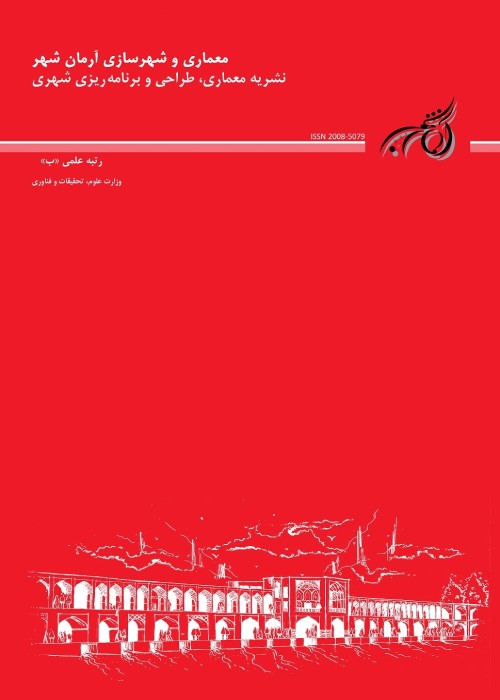Analyzing the Relation of Tenure Security and Investment Range in Housing, with Emphasis on Informal Settlement, Case Study: Koshtargah Neighborhood in Urmia
Author(s):
Abstract:
Urban housing informality has been receiving increasing attention in recent years; an interest reflected in the number of initiatives that have been launched by development organizations and a steady stream of academic writing on the subject. In most of these writings and initiatives, the problem solving potential of tenure security for improving living conditions in informal settlements features prominently in one way or another. In recent years, special attention has been given to tenure in security in improving informal settlements, in such a way that in 2003 and 2006 this has been on the main research pivots on informal settlements in UN-HABITAT. Thus, tenure security has become a deprivation index in settlements. Tenure security is one of the primary rights of households that its lack leads to economic, social, psychological and political challenges. In national document of Empowerment on informal settlements in Iran, it has been mentioned that lack of tenure security in informal settlements is one of the main reasons that reduces participation of households with local and governmental organizations. It is also the main reason for growth of legal uncertainty among dwellers in informal settlements. Secure tenure has been assumed to encourage investment by households and communities, stimulate economic initiatives, alleviate poverty, facilitate the provision of urban services and infrastructure, improve health conditions, make credit accessible, enable land markets, and contribute to the realization of the right to adequate housing. Following these results, different approaches have been taken in tenure security. These approaches classify into two distinct sets: traditional and new approaches. Traditional approaches have focused on tenure security more than legal aspects. They consider the tenure security as having ownership document for the official occupancy in one place. In recent years, scientific and practical experiences on tenure security index indicate that the expensive process of title deeds issuance has made the inhabitants reluctant to pursue the mentioned process due to their financial inability, and also because of powerful and influential forces in land market, land hoarding and speculation have come into existence. Although the new tenure security perspective does not negate the possibility that title can generate tenure security, argues that tenure security can be achieved by different factors that have been called extralegal (de facto) factors. The aim of the present research is to analysis the role of tenure security on housing investment; for this purpose, the relation of tenure insecurity and investment range in Koshtargah neighborhood the biggest center of informal settlement in Urmia has been examined. Research method is descriptive analytical, along with discovering relations of variables. Since the present study has both features of fundamental and applied research, we used survey method as the methodology of this research to achieve the research objectives and hypothesis test. According to this method, questionnaires were prepared and completed in Koshtargah district. Finally, using statistical techniques of partial and Pearson correlation, Factor analysis and multiple regressions, we completed our data analysis. After assessing this relation, 13 explanatory index of tenure security have been found through factor analysis in three following factors: de facto, legal and perceived tenure security. In examining investment range in housing two indexes, namely kind of building material and roof covering, are used; and four perceived indexes - namely willingness for increasing floor area, willingness for receiving housing loan, willingness for purchasing house and land for offspring and willingness for improving the house- which indicates willingness of inhabitants for investment in housing. The finding show that three factors of legal, de facto and perceived tenure security have positive and significant impact on housing investment, this relation has been confirmed with degree of correlation 0.000 at 99% confidence level. In the other words, positive relationship between tenure security and investment range in housing in Koshtargah, and the factors like de facto and perceived tenure security have more effect than legal tenure security on investment willingness in housing. According to the conducted analysis, it can be found that theoretical and practical research results are compiled together; because the Payne (2002), Cresol (2004) and Van Gelder (2007) argue that perceived and de facto tenure security can be more effective than legal tenure security on existing variables - especially housing quality and investment range in housing- in informal settlements. Therefore to offer suggestions for organizing Koshtargah neighborhood and Planning for investment of housing, these two factors (consist of de facto and precived tenure security) are the priorities.
Keywords:
Language:
Persian
Published:
Journal of Architect, Urban Design & Urban Planning, Volume:10 Issue: 19, 2017
Pages:
207 to 215
magiran.com/p1749091
دانلود و مطالعه متن این مقاله با یکی از روشهای زیر امکان پذیر است:
اشتراک شخصی
با عضویت و پرداخت آنلاین حق اشتراک یکساله به مبلغ 1,390,000ريال میتوانید 70 عنوان مطلب دانلود کنید!
اشتراک سازمانی
به کتابخانه دانشگاه یا محل کار خود پیشنهاد کنید تا اشتراک سازمانی این پایگاه را برای دسترسی نامحدود همه کاربران به متن مطالب تهیه نمایند!
توجه!
- حق عضویت دریافتی صرف حمایت از نشریات عضو و نگهداری، تکمیل و توسعه مگیران میشود.
- پرداخت حق اشتراک و دانلود مقالات اجازه بازنشر آن در سایر رسانههای چاپی و دیجیتال را به کاربر نمیدهد.
In order to view content subscription is required
Personal subscription
Subscribe magiran.com for 70 € euros via PayPal and download 70 articles during a year.
Organization subscription
Please contact us to subscribe your university or library for unlimited access!


